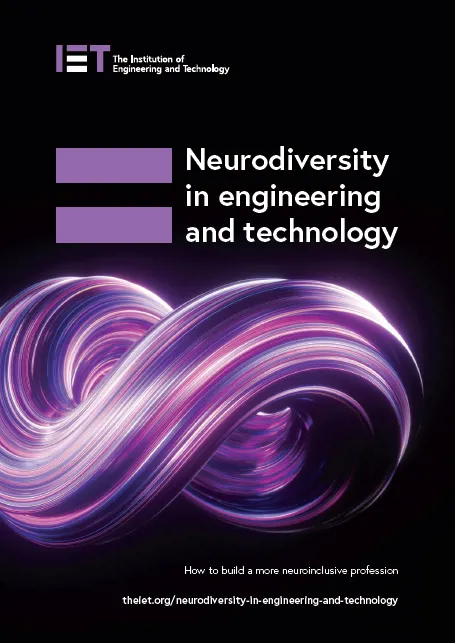Employers must support neurodivergent people to make sector more inclusive
The results of a new IET report published today reveals that there is an urgent need to make engineering and technology more inclusive for neurodivergent people – and it provides practical guidance to STEM employers, managers and colleagues of neurodiverse professionals and external partners to create a more inclusive working environment.
In 2022, the IET conducted a survey within our volunteer community and, of those who responded, 19% identified as definitely or possibly neurodivergent.
As a continuation to this survey, we carried out qualitative research involving a series of focus groups with engineers and technicians with lived experiences of neurodiversity, to better understand and increase awareness of the experiences of neurodivergent people within the engineering and technology sectors.
The report found that many are reluctant to be open at work due to stigma and say they face a range of challenges.
Many also find being part of an under-represented group magnifies the challenges, and that employers within the sector often miss the opportunity to benefit from specific strengths associated with neurodiversity.

It also highlights that not all workplace challenges that neurodivergent engineers and technicians face are related to the specifics of their neurotype – and it points out that challenges result from a range of other factors including lack of awareness and understanding; neurotypical approaches and expectations being the standard for workplace behaviour; accessing workplace adaptations and the impact all of these have on sustaining good mental health and well-being.
A big part of carrying out this research is what is done with the results. Therefore, the report includes guidance for key stakeholders on how to best build a more neuroinclusive environment including:
- Treating neurodivergent engineers and technicians as individuals
- Raising awareness and shifting attitudes
- Training line managers to support neurodivergent team members
- Integrating neurodiversity into working practices and culture
- Making it easier to access workplace adjustments
- Offering targeted career support where it is wanted
- Enabling neurodivergent engineers and technicians to access and build support.
Within the report, we also outline seven key commitments we’re making as an institution to improve the experiences of neurodiverse professionals within the sector, and how we plan to deliver these.
Dr Laura Norton, our Head of Equality, Diversity and Inclusion, said: “Neurodivergent engineers and technicians bring many and varied strengths to their work. Too often, however, these strengths are not recognised or appreciated by managers, colleagues or employers.
“There is a huge opportunity awaiting employers and teams in the engineering and technology sector who are willing to understand and address the needs of their neurodivergent staff and colleagues. We hope this study helps increase awareness and understanding, and spurs action towards realising that opportunity.”
Andy Parker, Chair of the Project Advisory Group, said: “As a neurodivergent engineer myself, it’s fantastic and very encouraging to see the IET pioneering research into the challenges and experiences of the neurodivergent community in engineering and technology – an area that has remained largely unexplored until now.

